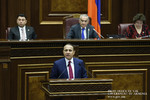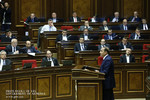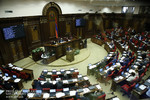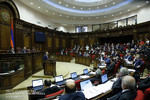Tuesday, 20 May 2014
Address by Prime Minister Hovik Abrahamyan to the National Assembly during introduction of the Government Program
Honorable National Assembly President,
Dear Members of Parliament,
I have the honor to introduce to you the new government program. It has been developed on the basis of the 2013 program, the National Security Strategy, the main provisions of the electoral platform of the President of the Republic of Armenia and the Republican Party, as well as those ideas set out in the programs of the parliamentary political parties in tune with the aforementioned documents.
I will try to focus on the main political approaches set out in government program and its rationale in a bid to state our approaches as to the development for the next three years.
The government members will specify their tasks, the reform agenda and the proposed impact in more detail. The program implies continuity. Developed by the Republican Party, it will seek to build on the strategic trends we have by making use of new mechanisms and instruments.
If I were to give a short summary of the program, I would call it realistic, strict and quick-responsive. Realistic as it strikes the right balance between the pledged objectives and resources; strict for its focus on equal conditions and the lack of double standards and finally, quick-responsive in terms of our willingness to discuss any such reasonable concern as may be raised by the public and political parties.
In the meantime, I would warn against the program’s being perceived in a one-sided and simplistic manner. Realistic does not imply lack of ambitions: it means strict awareness of resources.
At the same time, it seeks to get the most out of the existing resources in order to achieve thee specified targets. For instance, we cannot but be ambitious in defense matters: homeland’s safety does not tolerate incomplete measures. I can assure you that the “maximum impact through limited resources” formula does not mean partial immunity of our strategic borders.
We will provide complete and comprehensive security guarantees for Armenia’s and Nagorno-Karabakh’s population. Hardly anyone can admit that the large-scale project of reservoir construction to be discussed below is a routine undertaking. It focuses on strategic issues of water management in the Republic of Armenia and has a far-reaching impact in terms of our relations with our neighbors, the environmental problems faced in Ararat valley and Sevan basin, rural development and the vital need to strengthen bonds with the native land.
It will require multi-billion investments, talks with various partners, close interaction with communities and other stakeholders, as well as consistent implementation of high-quality construction work, which is not an easy task, but is sure to take effect. Its impact will be tangible in the countryside. Many people will feel the change.
Insistence on high standard does not mean indifference. Conditions cannot be seen as punitive, when equal for everyone. Far from being in favor of sanctions, I have always stressed the importance of incentives.
The government stands ready to assist any businessman, promote innovation, give a helping hand to any citizen in an open, transparent and public manner. Should economic growth and employment call for tax benefits or grants, they will be provided in an atmosphere of transparency and legality.
As such a move, in a bid to gradually call off the VAT payment requirement at the border, the Government plans to lower the threshold established for imports of fixed assets and raw materials.
Very often the use of the same rules for everybody proves difficult as there is some legislative fuzziness. The Government is firmly set to streamline the rules and clarify the situation. For instance, the status of small and medium-sized enterprises needs clarifying in order to apply the whole toolkit of assistance mechanisms.
Responsiveness does not mean lack of its own political line for the government or unconditional acceptance of any recommendation. The Government has accepted numerous ideas and proposals formulated by National Assembly-represented political forces, different civil society actors after harmonizing them with its vision of development.
As to those proposals not included in the Program, I have instructed to study them for further discussion. For instance, the need for antitrust laws has been talked about much recently. The applicable legislation on protection of economic competition is not based on the restriction of monopolies. Instead it is aimed at combating the abuse of dominant market position.
Such a change in the law should be discussed from the perspective of both international experience and enforcement feasibility. We will have a relevant analysis by yearend to help us take the best decision in this area
The road traffic problems or, more precisely, that of administrative penalties has been subject to heated debate in recent times. As you mat know, the Government has set up a committee to prepare proposals for ensuring proportionality of fines. In the meantime, I feel that the matter should be discussed in a public-private sector format, and this is reflected in our program.
Numerous are the ideas that cannot be performed due to insufficient funds. We do not have a magic wand that would allow, say, to significantly increase spending on education or health care. But we have the willingness to discuss and try out any reasonable proposal. For example, the proposal to establish industrial zones in the regions is quite promising. We cannot implement it immediately across the country, but we are prepared to try and understand the viability of the idea.
There are suggestions acceptable in theory, but unfeasible practically. For example, there is a proposal that the heads of independent commissions and supervisory structures should be nominated by the opposition. This idea might be acceptable in countries with well-organized political system. However, whereas we have such parliamentary forces as seem to be guided by the “the worse, the better” principle, who are reluctant to any possibility of cooperation, I have serious doubts that the proposal could succeed in Armenia. In contrary, amid escalating intolerance it may increase the polarization of society.
There are ideas seeking short-term prospects, for example, that of immediate suspension of the pension reform. I already expressed my position, namely that the pension reform is needed in our country and it should have a mandatory component. Nevertheless, we must find a smooth path beneficial to everyone. The reform should be mandatory but not imposed. Extensive work is being done to find a solution, which will soon be formulated for your consideration.
I repeat once again: while the program is based on realistic principles, yet it is ambitious and exacting. Against this background, I would like to outline several key provisions of the program.
The Government states that its primary target is the citizen and the guarantees to ensure their freedom, safety and well-being. The citizen is the center of our attention and the focus of our concerns, their well-being is a primary goal. We will do everything to fight the scourge of poverty and emigration. Poverty and emigration have numerous causes, and cannot be eliminated with one blow or one tool. However, they are the Government’s number one task.
The Government shall facilitate the citizens’ creative work in their homeland for their own future’s sake. Homeland is to be a safe haven for any Armenian to fully realize the skills, knowledge and experience gained in different parts of the world.
Any Armenian, irrespective of their country of residence, should know that the homeland offers business opportunities to tap on. Everyone should know that no one - I repeat - no one is entitled to grasp someone else’s property or business by force or by using authority in our country. I will be fighting such evil phenomena with every possible means.
The Republic of Armenia should become a land of many opportunities for everyone to live a decent life. This may be achieved through an environment conducive to equal opportunities and fair competition.
Only this kind of society can instill faith in the future and a sense of pride for the country. Only such economic system as is perceived to be fair by society may lead to investment growth and breakthrough steps.
The above should be achieved both through long-term effort – by means of constitutional reforms conducive to sustainable economic environment and seamless political transformations – and directly - by resorting to rapid and consistent steps against the existing distortion of the economic environment.
Shade is everyone’s enemy and should be combated consistently and on a regular basis. Proper documentation should be mandatory for everybody without exceptions. Here I wish to state that any reform must begin by changing ourselves. I am going to be exacting to my relatives first of all, and I will ask the same of all the members of the Government.
The indicator taxes / GDP ratio will grow and we will dispose of larger resources. However, this will not be done mechanically through higher tax rates. This index will be improved in tune with the fight against the shadow economy.
We must ensure that Armenia’s economy is open to both domestic and foreign investors. Inviting well-known foreign companies to Armenia will be one of our priorities. Not only will these efforts help increase the export potential of our economy through the use of the foreign partners’ traditional markets, but they are also supposed to become a clear and concise message that Armenia boasts a free and competitive economic environment.
To build a prosperous Armenia we must have a free and competitive environment, but this is not enough. The Government will have to promote entrepreneurship and stand by such citizens as may create even a single job, a single sample of new product by providing equal opportunities for doing business. To attract resources available for prospective business programs, the Government shall set up an investment fund in line with the best international standards. Achieved through joint efforts of the authorities and society, economic growth will help us cope with the existing welfare problems.
As noted above, the growth-affiliated employment problem stands out among other social priorities. Only stable jobs may enable the citizens to realize their social rights and guarantees, including that of a dignified remuneration. To get sufficient income the Government of the Republic of Armenia shall provide for systemic increase in salaries, consistent and proportionate to the conservation and promotion of the existing jobs. Along with the progressive rise in salaries in the public system, the Government will make efforts to ensure growth in private sector wages both by gradual increase in the minimum wage and by creating and maintaining the necessary economic infrastructures. In particular, the minimum salary will be gradually increased to 65 thousand drams over the next three years, and with it, common mechanisms of salaries will be applied in the public sector.
These activities of the Government will not only apply to government agencies and large companies. We will make every effort to improve the business conditions for individual entrepreneurs and farmers to ensure continued growth in their incomes. In this context, it is crucial for us to be consistent in providing them with effective facilities ranging from fiscal benefits to simplified tax administration.
I particularly want to emphasize the task of improving everyday life in the countryside. We will do our best to ensure that each farmer in Armenia - even those from the most remote villages – could feel that they are the citizens of the Republic of Armenia and are the center of the Government’s attention.
Support will be stepped up, capacity strengthened in rural areas. We will increase the scope of assistance to farmers with all possible tools (fertilizers, seeds, fuel and loan subsidies), and deploy new mechanisms (subsidies and loans).
Neither the social component will be ignored. Social services should be accessible and targeted in both urban and rural areas. For example, we will provide for harmonious development of the system of care allowance for children up to 2 years, lump sum benefits for childbirth and temporary disability, making them more focused and targeted.
We will continue to keep focus on the problems of our veterans of the Great Patriotic War and the freedom fighters. Education and health services should be available and accessible for everyone. People will no longer have to get to Yerevan for quality services. To enhance education quality, we will revise academic curricula, applicable standards and textbooks nationwide. Internationally acknowledged training programs will be introduced for teachers.
In healthcare, we will continue to implement reconstruction and refurbishment projects in regional medical institutions throughout the country to make available modern medical services.
We will pay greater attention to infrastructure. In particular, I want to talk in more detail about the construction of reservoirs, which will be targeted in order to drastically improve the viability of agriculture. For the rest, I will only outline the major landmarks.
During 2014-2017, systemic work will be carried out to provide for the design and construction of four major reservoirs - Kapps, Vedi, Yeghvard and Mastara. About USD250mn will be needed to this end leading to at least 145 million and at maximum 180 million cubic meter water accumulated yearly. This will help stabilize the process of irrigation in most parts of the country.
This program will not only help ease the burden on Sevan, solve the problems of the water basin in the Ararat valley, but also significantly improve the efficiency of agricultural activities. By combining this program with the increased volume of agricultural subsidies, the Government will create conditions for continued growth of incomes in agriculture.
Other economic infrastructures, too, will be the focus of the Government. In particular, the following investments are envisaged for 2015-2017:
• Irrigation (without the reservoirs) - 32 billion drams
• Construction - 138 billion drams
• School construction - 25 billion drams
• Overhaul of sports facilities - 2 billion drams
• Refurbishment of historical monuments - one billion drams
The maintenance and strengthening of economic infrastructure, along with the enabling of equal conditions for economic entities will lead to increased export potential and better conditions for a more ambitious and breakthrough growth in 2014-2017.
Summing up my speech, I would like once again to emphasize the main principles of the program – feasibility, exactitude and responsiveness. The Program can only be implemented with the support, cooperation and constant monitoring of society and all political forces.
The Government pledges unconditional commitment and dedication, looking forth to the public’s support for joint solutions of our common problems.
Thank you.










